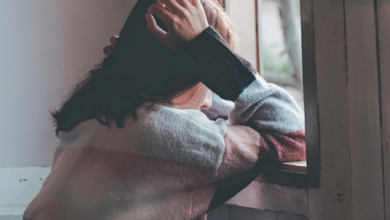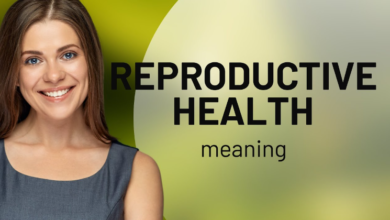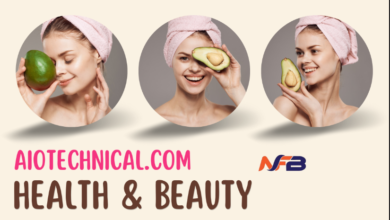Causes Of White Hair And Easy Ways To Prevent It Naturally: Top Tips!
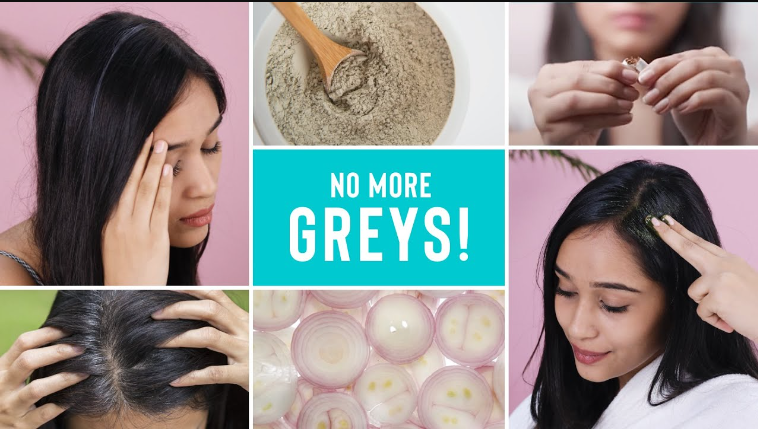
White hair can occur due to genetics, stress, and vitamin deficiencies. Preventing it naturally involves a healthy diet and stress management techniques.
Discovering white strands in your hair can be surprising, mainly if it occurs prematurely. Grappling with this change often leads to a quest for natural solutions. While many consider white hair a part of the normal ageing process, numerous factors can cause hair to lose its pigment earlier than expected.
Stress plays a significant role in affecting the health and colour of your hair, while genetic predisposition is also a key determinant. Nutritional gaps, particularly deficiencies in vitamins B12 and D and minerals like zinc and iron, can accelerate depigmentation. Adopting a nutrient-rich diet and engaging in practices that diminish stress can effectively preserve your natural hair colour. This promotes overall well-being and can slow down the emergence of white hair.
Contents
- 1 Myths Debunked: White Hair Realities
- 2 Hair Biology 101: Pigment And Color
- 3 Genetic Roots: Family History And White Hair
- 4 Internal Influencers: Health And Hormones
- 5 External Elements: Environmental Factors
- 6 Stress Strands: How Stress Contributes To White Hair
- 7 Natural Remedies: Nutrition And Lifestyle Changes
- 8 Topical Treatments: Harnessing Nature’s Power
- 9 Prevention Tactics: Maintaining Your Natural Color
- 10 Conclusion
Myths Debunked: White Hair Realities
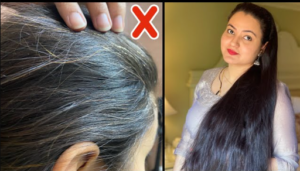
Discover the truth behind white hair. Many people worry about early white strands. Let’s explore common myths and scientific realities about white hair. It’s time to separate fact from fiction.
Common Misconceptions
- Plucking one’s white hair grows more: That’s not true.
- Stress turns hair white overnight: This is a myth.
- White hair always means old age: Young people get it, too.
What Science Says
Genetics play a role. Your genes determine white hair. Lifestyle impacts hair health. Good habits can delay white strands—melanin production matters. Melanin gives hair colour. Over time, it decreases, leading to white hair. Nutrition is key. A balanced diet keeps hair healthy.
| Myth | Reality |
| Certain foods reverse white hair: | No food changes hair colour back. |
| White hair is less healthy: | It’s normal hair, just without colour. |
| Hair dyes prevent white hair: | Dyes cover, don’t prevent. |
Hair Biology 101: Pigment And Color
Understanding why hair turns white requires studying hair biology, specifically pigment and colour. Hair colour is not just a fashion statement; it’s a complex biological process—the natural hue of our hair results from the pigments produced by cells in our hair follicles. Let’s explore how these pigments influence hair colour and what causes them to change over time.
Melanin’s Role In Hair Color
Melanin is the fundamental substance that determines the colour of hair. It is made by cells called melanocytes. There are two types of melanin:
- Eumelanin – provides black or brown colour to hair
- Pheomelanin – gives hair red or blond tones
The mix and concentration of these melanin types result in the wide variety of hair colours we see. As we age, melanocytes slow down and eventually stop producing melanin, leading to white hair.
The Hair Lifecycle
Each hair on our head follows a life cycle: growth, rest, and shedding. This cycle includes:
- Anagen Phase – The growth phase where hair actively grows.
- Catagen Phase – A transitional phase where growth stops, and the hair follicle shrinks.
- Telogen Phase – The resting phase before hair eventually falls out.
As hairs cycle through these stages, the production of melanin can differ, contributing to hair colour changes over time.
Genetic Roots: Family History And White Hair
When strands of hair surrender their colour, white hair takes the stage. Family history plays a pivotal role in this natural transformation. Understanding the Genetic Roots: Family History and White Hair are crucial in addressing early greying signs.
Heredity Factors
Genetics sway over the age at which your hair starts losing its natural pigment. If your parents or grandparents flaunted a silver mane earlier in life, you might, too. It’s written in your DNA.
- Inherited genes dictate hair colour changes.
- Patterns often follow familial timelines.
- Observing your family tree can offer clues.
Genetic Predisposition
Some genes are specific architects of hair colour. Their blueprints can lead to the premature appearance of white hair. Yet, not all is lost to genetics.
| Natural Prevention Strategies |
| Consume antioxidant-rich foods |
| Embrace stress-reduction techniques |
| Avoid harmful chemicals in hair products |
While you can’t alter your genes, you can influence how they express themselves. A healthy lifestyle may postpone whitening, letting you enjoy your natural colour longer.
Internal Influencers: Health And Hormones
Our bodies are complex systems. Like a finely tuned machine, everything from our hormones to our nutritional intake plays a pivotal role. A few critical internal factors regarding hair health can influence our strands’ pigment or colour. A deeper look into health and hormonal impacts helps us understand the root causes of white hair. Adopting a natural prevention approach starts with tuning into your body’s internal needs.
Hormonal Changes Impact
Hormones act as messengers in our body. They tell our cells what to do and when. Changes in these can affect hair colour. For instance, hormonal shifts during menopause or pregnancy are regular. These shifts can turn hair white. A balance can prevent premature greying.
Nutritional Deficiencies
What we eat fuels our bodies. Missing out on essential nutrients can affect hair colour. Let’s explore:
- Vitamin B12: Essential for healthy hair growth and colour.
- Iron: Low levels can lead to greying.
- Copper: Helps in melanin production, the pigment that gives hair colour.
Eating a balanced diet rich in these nutrients supports natural hair colour maintenance.
Thyroid And Other Conditions
The thyroid gland controls many body functions. It affects metabolism and hair health. Conditions like hyperthyroidism or hypothyroidism can lead to white hair. Other autoimmune conditions, like vitiligo, also play a role. Regular check-ups and treatments help manage these conditions, potentially preventing white hair alterations.
External Elements: Environmental Factors
Greying hair is a natural part of ageing. External elements, specifically environmental factors, are pivotal in causing white hair. Day-to-day exposure to various elements can expedite this process. Understanding these can help you adopt measures to protect your hair.
Sun Exposure
Direct sunlight bears down on the scalp and hair. Ultraviolet (UV) rays can weaken hair shafts. This leads to loss of pigment and colour. Guard your hair by:
- Wearing hats or scarves
- Applying protective hair serums containing UV filters
- Leveraging hair care products with natural sunscreens like coconut oil
Pollution
Pollutants can be ruthless to hair. Smog, dust, smoke, and particulate matter cling to hair strands, leading to oxidative stress, which subsequently affects melanin production. Cleansing your hair with gentle, natural shampoos and purifying scalp treatments can be helpful.
Hair Products And Chemicals
| Product Type | Impact on Hair | Natural Alternatives |
| Dyes and Colorants | Strip away natural colour; damage hair cuticle | Henna: tea rinses |
| Perms and Relaxers | Break down hair proteins; cause fragility | Heat-free styling; braiding |
| Sulfate Shampoos | Strip hair of natural oils; dry out the scalp | Sulfate-free cleansers; conditioning with oils |
Always patch-test any new product. Opt for hair care items that omit harsh chemicals. Nurture your hair with deep conditioning treatments regularly to combat damage.
Stress Strands: How Stress Contributes To White Hair
Grey hair might not be just a sign of ageing. Stress can lead to premature greying. Let’s explore how everyday tensions impact hair colour.
The Science Of Stress On Hair
Stress does more than wrinkle your skin. It affects hair pigments, too. Stress triggers Nerve-Related damage that disrupts hair growth and pigment production.
- Stress spurs hair follicle changes.
- It leads to the depletion of colour-producing cells.
Cortisol Overload Effects
Too much cortisol, the stress hormone, affects your body. Here’s its impact:
| Cortisol Impact | Effect on Hair |
| Shutdown of pigment cells | Hair loses its colour. |
| Hair growth slowdown | Fewer new hairs grow. |
Understanding these effects can lead to natural prevention methods. Minimizing stress is a crucial step. Yoga, meditation, and exercise are great stress-busters. Adopting a healthy diet rich in antioxidants helps, too.
Natural Remedies: Nutrition And Lifestyle Changes
Natural solutions can slow the ageing process of white hair. Hair gets its color from a pigment called melanin. With age, melanin production drops. This change may seem unavoidable, but nutrition and lifestyle have huge impacts. Eating right and living well could preserve hair colour. Let’s explore how proper food and habits fight white hair.
Best Foods For Healthy Hair
Hair thrives on protein, iron, and omega-3 fatty acids. Include these foods in your diet:
- Salmon: Rich in protein and omega-3s
- Spinach: Iron-packed greens maintain hair follicles.
- Nuts and seeds: Snack on almonds, walnuts, and flaxseeds for minerals.
- Eggs: These contain biotin, which is paramount for hair growth.
Vitamins And Minerals That Matter
Essential nutrients keep hair colour. They include:
| Vitamin/Mineral | Benefits | Food Source |
| Vitamin B12 | Prevents premature greying | Liver, meat, milk, cheese |
| Iron | Supports healthy hair | Red meat, beans, lentils |
| Zinc | Boosts hair repair | Oysters, beef, pumpkin seeds |
| Copper | Aids in pigment production | Shellfish, whole grains, nuts |
Stress-reduction Techniques
Stress turns hair white. Fight stress with:
- Yoga: Try poses like Downward Dog.
- Meditation: Daily practice helps calm the mind.
- Regular exercise: Walking or swimming reduces stress.
- Adequate sleep: Aim for 7-8 hours nightly.
All these calm the body and may prevent white hair.
Topical Treatments: Harnessing Nature’s Power
Topical Treatments: Harnessing Nature’s Power can be a game-changer in your battle against white hair. Nature offers a bounty of remedies that can nurture your hair’s pigmentation for a healthier look. By applying natural substances directly to your scalp and hair, you empower your locks with goodness straight from the earth. These treatments help not only nourish your follicles but also reduce premature greying. Let’s explore the potent elixirs and concoctions you can create at home.
Essential Oils And Their Benefits
Essential oils are like liquid gold for your hair.
- Rosemary Oil: Stimulates roots, improves hair growth, and restores colour.
- Lavender Oil: Soothes the scalp and reduces stress, a white hair culprit.
- Thyme Oil: Packed with nutrients crucial for hair pigment production.
Mix a few drops with a carrier oil like coconut or almond oil for best results. Massage into your scalp. Leave it overnight to let your hair soak in the benefits.
Homemade Hair Mask Recipes
Create your hair masks using simple ingredients for lustrous, vibrant hair.
| Ingredients | Benefits | Instructions |
| Coconut Oil and Lemon Juice | Prevents greying, nourishes scalp | Mix 2 tbsp of oil with 2 tsp of lemon juice, apply for an hour, then rinse. |
| Curry Leaves and Oil | Restores melanin in hair follicles | Boil leaves in oil, cool, apply to roots for 30 mins, and wash off. |
| Henna Powder and Coffee | Colour restoration, conditions hair | Blend 1 cup of henna with 3 tsp of coffee, apply, leave for 3 hours, rinse. |
Use these masks once a week for best results. Your hair not only stays naturally coloured but also looks lusciously healthy.
Prevention Tactics: Maintaining Your Natural Color
Age may bring wisdom, but it also comes with white hairs. While genetics play a significant role, lifestyle choices can also influence hair colour. Let’s explore natural strategies to keep original hues shining through longer.
Healthy Hair Habits
Healthy hair starts with good nutrition and proper care. Here are everyday tips:
- Eat plenty of protein: Hair is made of it. Good sources include eggs, nuts, and fish.
- Vitamins are vital: B vitamins and antioxidants help prevent premature greying. Think green veggies and fruits!
- Stay hydrated: Drink water for moisture from the inside out.
- Scalp massages: They boost blood flow to your hair follicles.
- Limit stress: Meditation and exercises can help.
When To Avoid Hair Treatments
Some hair treatments can damage your hair’s natural colour. Know when to say no:
| Treatment | Why to Avoid |
| High Heat Styling | It can weaken hair roots. |
| Chemical Dyes | They might lead to a colour loss over time. |
| Bleaching | It damages the natural pigment. |
| Perms | Chemicals can strip hair of its natural oils. |
Opt for natural dyes, like henna, to keep hair healthy.
Conclusion
Addressing white hair concerns requires a multifaceted approach. Embrace natural remedies and a healthy lifestyle to combat premature greying. Regular care and proper nutrition are vital to maintaining your hair’s natural vibrancy. Remember, prevention is better than cure, so start early.
